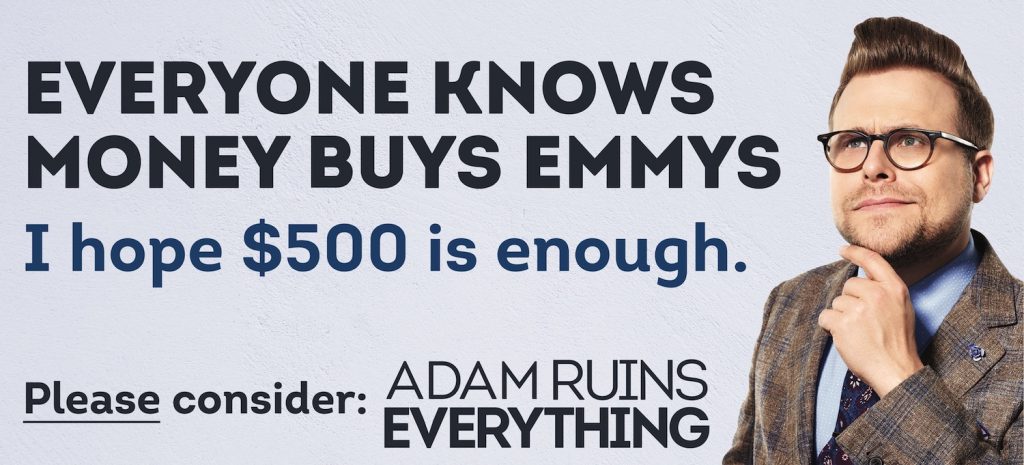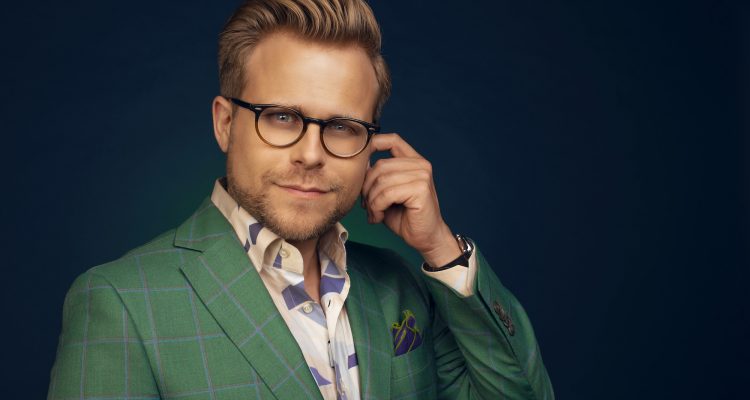“I can’t just assume that I’m right because I’m the one talking, I’m subject to the same biases and cognitive errors as everyone,” says Adam Conover. The witty host has amassed a sizable audience for truTV’s Adam Ruins Everything, the series in which he debunks common misconceptions and reveals the awful truth about the things you love.
Conover began his career as a sketch comedy writer and performer for CollegeHumor, where he first created and starred in the 2014 web series Adam Ruins Everything. A year later, Conover transformed the web series into a show for truTV.
In season three, Conover doesn’t shy away from lofty and ambitious topics — tackling everything from the United States Constitution to the problems in his own show. With only days remaining until Emmy voting commences, Conover has launched an inventive billboard campaign to promote his staff for Emmy consideration.
Conover spoke to Awards Focus about his DIY Emmy campaign, the evolving process of Adam Ruin’s Everything, and how they accomplished what no other TV show has done before them.
Awards Focus: Let’s start with the pitch that landed you this series. Did you give the executives a presentation much like you do on the show to your viewers?
Adam Conover: We had previously done a web series on CollegeHumor that had four episodes that were big hits. We showed some clips, and I walked them through what an episode would look like, which definitely involved me ruining stuff for them in the room.
AF: I’m assuming you pitched several potential episodes for the series. Were all of those ultimately featured on the show?
Conover: It took us a couple of years to get to all of them, but within two or three years, we had hit them all.
AF: How do you determine what topics are episode worthy? Can you walk me through that creative process?
Conover: We have an incredibly intense research process. We start our weeks with an open pitch session. If a pitch makes all of us in the writers’ room say, “Oh my gosh, I can’t believe I didn’t know that,” then it’s a good topic for our show. Then, researchers beat it out and make sure that it’s not a fringe view. We’ve lost plenty of topics at that stage.
AF: What’s a topic you’ve lost because it was too fringe?
Conover: We had an episode called Adam Ruins Halloween that was about our perception of witches. In medieval Europe, witches were local medicine-women. But the Catholic Church viewed them as threats and promoted anti-witch propaganda, including the idea that they ride on broomsticks. That was the beginning of the evil witch that we know today. That was a great story, but we found that only one historian promotes that view. We wanted more certainty than that.
AF: When you first started the show, did you anticipate three seasons?
Conover: I had no anticipation when we started the show. I always understood that we were making it through the eye of the needle, and that we were extraordinarily lucky to have found an audience. I still feel that way. If all we had done was the pilot, I would’ve felt alright about that, because it was a step up for me.
AF: Tell me about how your process evolved creatively from the beginning to this season.
Conover: The show originally was a bit glib. It was a lot of me saying, “Here’s how it is.” But every intellectual exploration is more nuanced than that, so we started to fold more complexity into our stories and moderate our approach. Also, I play a character version of myself, and that character has a life. That ended up being the most interesting challenge. Every season, we had to find something new for this character to do while he’s sharing all this fascinating information. That journey was one of my favorite parts of the show.
AF: In each episode, you bring in professors and other experts. Are they usually excited to get involved, or does it often take some convincing?
Conover: It depends. One of the best things I hear is, “My kids love your show.” That means it’s going to be an easy yes. But some say, “I’ve never heard of this show, why should I come out to LA to shoot with you?” We have to convince them that we will share their work with an audience they don’t normally reach. Most are receptive to that.
AF: How do you weigh their expertise against their ability to be engaging and television-friendly?
Conover: We get all types. Some of them are very stiff, which I really enjoy on camera because the audience can recognize that they’re a real person. But some are very comfortable in front of an audience, especially college professors who spend a lot of time teaching. One of the most rewarding things about the show is meeting those fascinating and incredible people, and putting them on television.
AF: You discuss a lot of sensitive topics, and some of your episodes could be pretty controversial. Are you ever concerned about backlash?
Conover: I don’t write the show with backlash in mind. Regarding our episode Adam Ruins Cops, we need to be clear-eyed and straight-forward about problems with policing in America, and I’m proud to do that. There are people who can’t ever bear to hear a critical word about the police. I’m not worried about those people. I’m thinking about the audience at home, and how the show works for every single one of those folks. Cops are going to watch that episode, and I want to make sure that they feel respected and represented, even if we disagree. I’ll often hear, “I don’t agree with every point that you made, but you made it respectfully, and I appreciate you raising the issue.”
AF: Was there one episode this season that stood out as the most challenging?
Conover: In our season finale, Adam Ruins Himself, I played an evil trickster version of me, and I explained to myself everything wrong with my show. It was emotionally difficult to delve into our own past mistakes, potential conflicts, and flaws. It was also complicated to shoot because I play opposite myself. Changing my performance back and forth between those different versions of me was a wonderful acting challenge.
AF: What made you decide to pursue that idea despite its challenges?
Conover: My show is about questioning what you think you know and being honest with yourself, and that applies to me too. I can’t just assume that I’m right because I’m the one talking. I’m subject to the same biases and cognitive errors that anyone else is. The only way that I can approach the truth is by being clear-eyed and specific about where my biases lie, and what I’m doing to overcome them. It was important to me to model that for the audience, and it was a good thing to do intellectually. It makes you more credible, and it makes me sleep better at night.
AF: Do you feel that that extra effort paid off?
Conover: It was absolutely worth the work. We did things that have never been done on TV before. The third act discusses whether advertising impacts the content of our show. We criticize advertising, but we have to deal with the network ad sales department. As much as I want to say I have integrity, don’t these ads affect the process? I don’t think any other show has ever explicitly said, “These are the ways that the network’s advertising department has interfered.” We’re incredibly proud of that episode.
AF: You’ve put some striking billboards up across Los Angeles. How many people are involved in crafting the concepts for the billboards? What was the process like?
Conover: This is an entirely DIY campaign. I wrote the billboards myself, then hired a graphic designer I’ve worked with before to design them. I cold-emailed the billboard company, asking what the lowest rate they could give me for billboards in Los Angeles is. That’s pretty much it! I can guarantee that this was the most cost-efficient FYC campaign in the history of awards season.

AF: Were there any billboards that didn’t make the cut?
Conover: Honestly, I wished I could have called out every writer, producer, director and crew member on our show with their own billboard, but that would have bankrupted me pretty quickly! The entire point of this project was to give our staff and the show the chance to be recognized like they deserve, so narrowing it down was incredibly difficult.
AF: What do you hope audiences take away from Adam Ruins Everything?
Conover: I hope for it to open people’s minds, make them more critical of what they think they know, and empower them intellectually. I want to make them more trusting of experts; I want to give them respect for human knowledge. And I want to make them laugh. I want to spread these ideas as widely as possible, and I’m thrilled that we’ve done that. We’ve discussed 180 topics, and every single one of them has the power to change the way you see the world. So many people have come up to me and said, “We didn’t get an engagement ring because of you.” “You made me feel better about formula feeding.” “We didn’t get our son circumcised because of you”—it’s huge to have had an impact on people’s bodies like that. I don’t plan on stopping doing this type of work any time soon, and I’m really proud of the impact our show has had.


